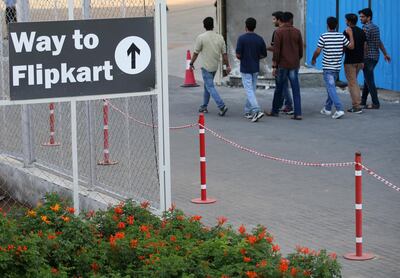Following Walmart’s $16 billion acquisition of Flipkart – India’s homegrown e-commerce market leader – it is not just the founders of the company who are counting the benefits of the move.
The deal, one of the biggest in the e-commerce sector globally, is expected to have a widespread impact on India, from its effect on the retail landscape to the foreign investment environment.
“Walmart’s investment in Flipkart is clearly a bold move,” says Mahesh Singhi, the founder and managing director of Singhi Advisors, an investment banking firm based in Mumbai.
Walmart's president and chief executive, Doug McMillon, who flew into India to unveil the deal following weeks of speculation that the US retail major would takeover Flipkart, said he sees India "as a critical market". While some analysts have described the purchase as expensive, the opportunity is enormous. India's e-commerce sector is still at a nascent stage but rising incomes, a young demographic, and rapidly growing internet use bode well for the industry.
Investment bank Morgan Stanley forecasts that India’s e-commerce industry will expand at 30 per cent a year to reach a gross merchandise value of $200bn by 2026.
Walmart’s buyout of Flipkart will see it going head to head to fiercely compete with Amazon, which operates in India and is Flipkart’s biggest rival. Amazon is also understood to have held talks with Flipkart to look at buying a stake.
Flipkart, like its American competitor, started out as an online bookseller, launched by two young Indian entrepreneurs Binny Bansal and Sachin Bansal, who are not related, set up out of an apartment in Bangalore with just a few thousand dollars. The acquisition by Walmart of a 77 per cent stake for about $16bn, sees Sachin exiting the company, while Binny will stay on.
Binny says the deal will bring more focus on India from overseas investors, writing on Twitter that it was "the dawn of a new era for India's #StartUp ecosystem".
Last week, it emerged that Google’s parent company Alphabet is in discussions to potentially invest in Flipkart alongside Walmart, according to CNBC.
“The deal indicates the attractiveness of India’s consumption market for global majors,” says Ajay Srinivasan, the director of Crisil Research, a ratings and research company that is part of Standard & Poor’s.
With Walmart’s expertise, he expects an “enhanced thrust on the online grocery segment” in India, which he believes will “be the fastest growing segment” in the county’s online shopping sector.
But not everyone has welcomed the move. Dozens of protesters connected to a right wing Hindu party Rashtriya Swayamsevak Sangh gathered outside a New Delhi hotel where Mr McMillion was briefing journalists. The protesters brandished placards with slogans such as "Walmart Go Back!" They argue that the deal goes against the country's national interests with India's e-commerce space now completely dominated by two American giants.
Small traders say they are worried about the impact on their business, with online growth expected to be propelled by Walmart’s presence.
“We can’t compete with these big names and the discounts they offer,” says Arvind Chauhan, who runs a small grocery store in south Mumbai. “We’re just small guys. They have so much money. I don’t know what I’d do if my shop goes out of business.”
Walmart has long been trying to make inroads in India’s brick-and-mortar retail sector, and there are fears among mom-and-pop stores that although its e-commerce investment does not give the US firm direct access to the offline shopping market, this could be the next step.
India's governments for years have tried to limit the entry of big-box foreign supermarkets. In 2012, the previous administration opened up the retail sector to supermarket chains, allowing foreign direct investment of up to 51 per cent. But Walmart's joint venture in India with Bharti Enterprises turned sour and was dissolved in 2013, while the company suspended plans to open supermarkets in the country, citing requirements for foreign chains including having to source 30 per cent of their products from local small and medium-sized enterprises. The company does however, have 21 wholesale cash and carry stores in India.
However, in general, attracting foreign investment has been a priority of the current government under Prime Minister Narerndra Modi, as part of a strategy to create much-needed jobs in the country and boost economic growth.
There are those who are celebrating the deal in style. Ashish Gupta, the founder of a venture capital firm called Helion Ventures was Flipkart's first angel investor, injecting 1 million rupees (Dh54,474) into the then fledgling online shopping website, the Indian business newspaper Mint reports. He now stands to make $20m out of the sale.
Mr Gupta did not respond to a request for comment.
_______________
Read more:
UK grocer Sainsbury's to buy Walmart's Asda for £7bn
Online shopping comes of age in India
_______________
A source who held a senior role at Flipkart and is close to the founders and other investors said that investors had been instructed not to comment, with the deal still being subject to clearing regulatory approvals.
Mr Singhi says Walmart's entry into India will see it bringing its “extensive experience in retailing, logistics and supply chain management” to the company and country, helping to up the game in the market.
Abneesh Roy at Edelweiss Research, a financial services company based in Mumbai, says that small and large retail companies could gain from the takeover, with Walmart looking at tying up with small shops.
“Fast moving consumer goods companies are likely to benefit as Walmart’s expertise lies in hypermarkets and grocery retailing,” he says. “Flipkart will offer scale to Walmart’s India operations.”
Flipkart has 100 million registered users and more than 8 million monthly shipments and Walmart's takeover will help to modernise the retail market, Mr Roy says.
“To scale up the business and achieve next leg of growth, Walmart and Flipkart plan to support 5 million to 6 million kirana [small] stores through modernisation of retail practices as well as digital and cashless transactions for sustainable growth,” he says. “Success will, however, hinge on how both the entities integrate their crucial business practices and policies.”
Other analysts agree that there could be a wave of benefits for Indian companies.
“Homegrown companies stand to benefit in the long run,” says Adrian Lee, the research director at Gartner, an advisory company.
And the consumer also stands to reap the rewards from continued discounts amid the stiff competition.
“User choice should be improved, with a greater range of Walmart private labels differentiating the merchandise,” says Mr Lee. “Flipkart will diversify its inventory to attract more Indian consumer segments that still haven’t started shopping online.”
The deal looks set to have a huge impact on the landscape of India's retail market and beyond.



